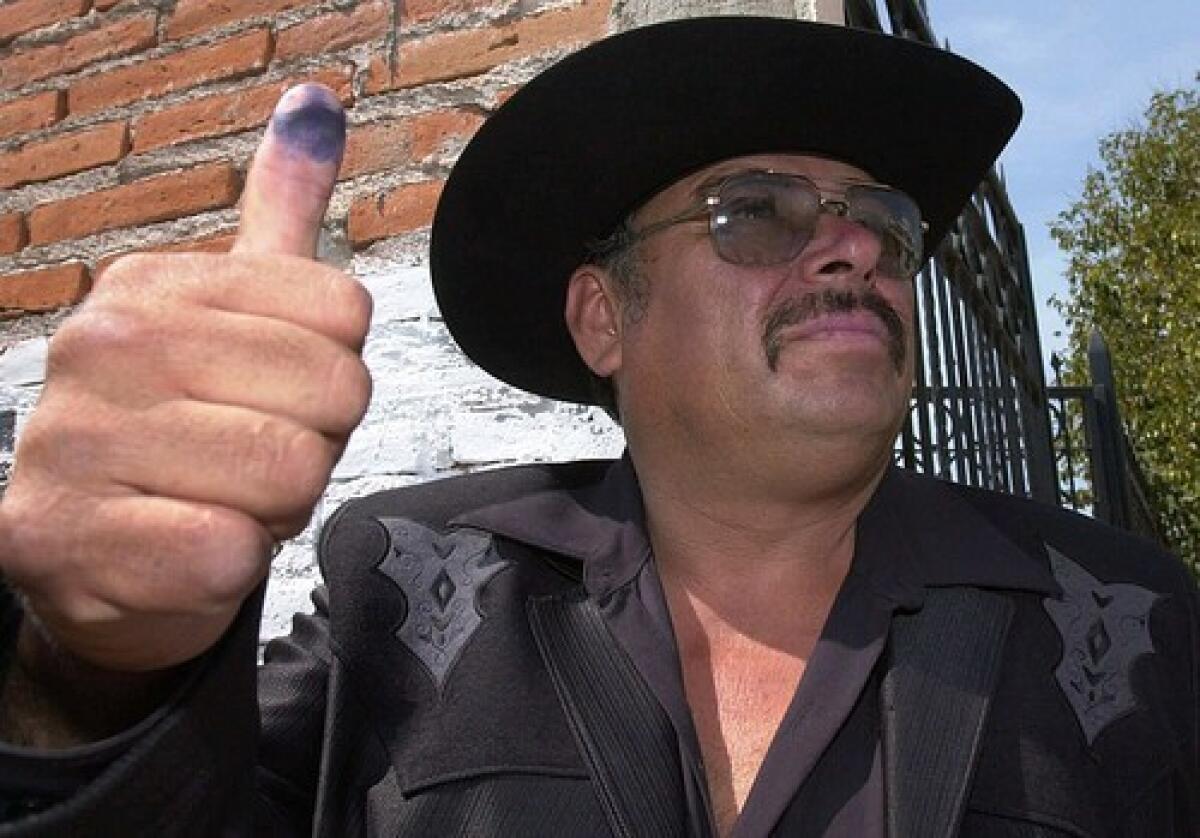Andres Bermudez dies at 58; ‘Tomato King’ and Mexican officeholder

- Share via
Andres Bermudez, the burly immigrant known as the “Tomato King,” who made his fortune as a rancher near Sacramento and was believed to have been the first immigrant in the United States to win a mayorship in Mexico, has died. He was 58.
Mexican President Felipe Calderon announced that Bermudez, a congressman in Calderon’s National Action Party, died of stomach cancer Thursday. Mexican newspapers reported that he died at a hospital in Houston, where he had been receiving treatment since December.
The Mexico City daily El Universal said that his congressional colleagues held a moment of silence. Then they roared “Time!” -- the word Bermudez was known for yelling in his hoarse baritone to get speakers off the podium during fights in Congress in 2006 over whether the then-embattled Calderon would be allowed to speak to legislators.
A website from his hometown of Jerez in the north-central state of Zacatecas -- jerez.com.mx -- mourned his death and hailed him as “a legend.”
The son of a poor dairy farmer, Bermudez was born in 1950 and reared in the hills above Jerez. In 1974, the day after he was married, he and his bride, Irma, crossed from Tijuana into California in the trunk of a car.
Over the years, he went from farm laborer to foreman and labor contractor and rancher in the Yolo County town of Winters. He grew tomatoes and bell peppers, and invented a tomato-planting machine that made him a fortune.
Bermudez built his family a large house on the land he once worked. He added a swimming pool but swam in it only once, almost drowning. “To be rich, you gotta have a swimming pool,” he told a reporter.
In 2000, Zacatecas Gov. Ricardo Monreal visited and urged him to run for mayor of Jerez.
Bermudez was unlettered and coarse. Analysts later doubted Monreal meant his invitation seriously, but Bermudez took him up on it and appeared in Jerez to run for mayor in 2001 in Monreal’s center-left Party of the Democratic Revolution.
The media quickly dubbed him the Tomato King. Immigration scholars hailed him as a “binational symbol.”
Zacatecas has sent hundreds of thousands of immigrants to the United States. Most families in Jerez have relatives in the U.S.
Bermudez’s candidacy reflected long-held animosities these immigrants had for Mexico’s elites, who they felt had run them out of the country.
He ran for office boasting of his American success and vowing that “now it’s our turn” to run things.
“Immigrants aren’t contaminated by the political system here,” he once told a reporter driving around Jerez. “People here see a rock in the road, and it’s been there for 50 years, and it seems to them natural that it’s there. But those who come from outside say, ‘Why don’t you just remove the rock?’ ”
Immigrants, especially in California, responded by lobbying family members back home on his behalf. Some caravaned down from Anaheim to vote for him.
Coming a year after the historic victory of President Vicente Fox, Bermudez’s candidacy was viewed as reflecting another change for Mexico: the rise of immigrant political power.
Bermudez ran against a woman who was among the few people in Jerez with no relatives in the United States, and he won handily.
His postelection rhetoric reflected many immigrants’ anger. The elites were now “the ones who’ll have to leave here as wetbacks -- the merchant, the son of the politician,” he said.
Meanwhile, Bermudez quickly became a media star, fielding interviews from France, Japan and Spain.
He usually dressed all in black -- including a cowboy hat and boots. He claimed once to have three wives. He drank beer with gusto. The first vote he cast in his life was for himself.
Bermudez told everyone that he signed a deal with Warner Bros. for a film based on his life story. He attended parties in Anaheim, Chicago and San Jose.
He didn’t return to Jerez for weeks, leading even supporters to grumble. Bermudez “is more interested in appearing in movies and books about his life” than in getting to work at City Hall, wrote a columnist in El Alacran, a small local newspaper.
His term ended before it began. His victory was overturned when election officials discovered that he had listed Winters as his primary residence.
Still, his candidacy and the ensuing controversy gave rise to legislation that allowed immigrants in the United States to run for office in Mexico under certain conditions.
Bitten by the political bug, Bermudez ran again for mayor of Jerez in 2004. When the PRD refused his candidacy, he switched to the center-right National Action Party and, with revised residency requirements, won. In 2006, he stepped down, leaving his brother, Serafin, as mayor, and successfully ran for federal congressman.
In the halls of Congress, Bermudez often led the charge against his former party, the PRD, as it attempted to keep Calderon from speaking to Congress.
“He was the Mexican who was able to return home and thumb his nose at the elites who drove millions of their countrymen away,” Gustavo Arellano, a columnist and reporter with the OC Weekly, whose mother hailed from the same village as Bermudez, wrote in an e-mail.
More to Read
Start your day right
Sign up for Essential California for the L.A. Times biggest news, features and recommendations in your inbox six days a week.
You may occasionally receive promotional content from the Los Angeles Times.






